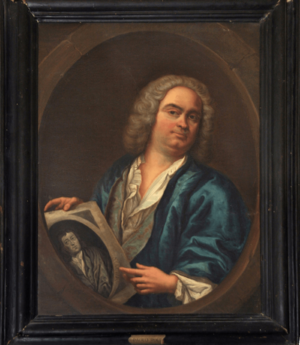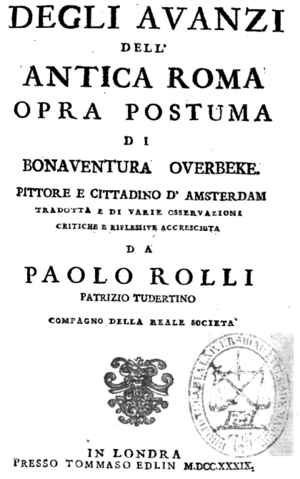Paolo Rolli facts for kids
Paolo Antonio Rolli (born June 13, 1687 – died March 20, 1765) was a talented Italian writer. He was a librettist, which means he wrote the words for operas. He was also a poet and a translator, someone who changes text from one language to another.
Contents
Paolo Rolli's Life Story
Paolo Rolli was born in Rome, Italy. He learned from a famous teacher named Gian Vincenzo Gravina. Later, a rich English nobleman, the Earl of Burlington, invited Rolli to come to England.
Working for the Royal Family
Rolli moved to London in 1715. He became a language tutor for the royal family. He taught Italian to Caroline of Ansbach, who was the Queen. Then, he taught her children, including Frederick, Amelia, and Caroline. He stayed in this role until 1744.
Writing for Operas
During his time in England, Rolli wrote many librettos for Italian operas. He worked with famous composers like Handel. Some of the operas he wrote for Handel include Floridante (1721), Muzio Scevola (1722), and Riccardo Primo (1927). He also wrote for Nicola Porpora, including La festa d'Imeneo (1736).
Rolli also worked often with the composer Giovanni Bononcini. He wrote and changed many librettos for him. One of their popular works was Griselda (1722).
A Member of the Royal Society
In December 1729, Paolo Rolli was chosen to be a Fellow of the Royal Society. This is a very important group of scientists and thinkers in England.
Other Writings and Translations
Rolli was very busy in England. Besides writing for operas and teaching the royal family, he also published his own poems. These included Italian odes and elegies, which are types of poems. People really liked his writing style.
He also published new editions of important books. For example, he published a new version of Ariosto's Rime e Satire in 1716. In 1729, he completed the first full Italian translation of Milton's famous poem, Paradise Lost.
Return to Italy
After Queen Caroline, who was his royal supporter, passed away in 1737, Rolli decided to leave England. He went back to Italy and settled in Todi. He passed away there in 1765. He left behind a large collection of interesting items and many well-chosen books.
Rolli's Influence
Even a famous German writer, Goethe, knew Rolli's work. Goethe mentioned that he learned one of Rolli's songs by heart. He did this even before he knew any Italian words!
Paolo Rolli's Published Works
Here are some of the collections of poems and writings that Paolo Rolli published:
- De' Poetici Componimenti del signor Paolo Rolli (published in Venice in 1753 and 1761, and in Nice in 1782).
- Componimenti poetici in vario genere (published in Verona in 1744).
 | James Van Der Zee |
 | Alma Thomas |
 | Ellis Wilson |
 | Margaret Taylor-Burroughs |



